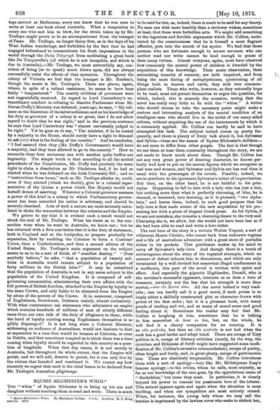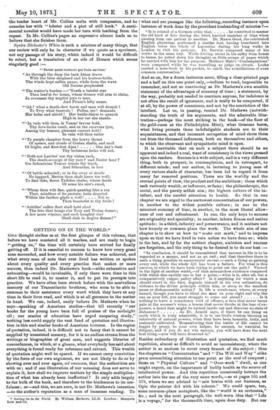SQUIRE SILCHESTER'S WHIM.*
-THE " whim " of Squire Silchester is to bring up his son and daughter without teaching them to read and write. There is much * Spire &Wester's Whim. By Mortimer Collins. 3 vols. London: H. S. King -and Co. 1878.
to be said for this, as, indeed, there is much to be said for any theory. No man can wish more heartily than a reviewer wishes, sometimes at least, that these were forbidden arts. We might add something to the ingenious and forcible arguments which Mr. Collins, unde- terred by the consciousness that he is himself a most flagrant offender, puts into the mouth of his squire. We find that those persons who are fortunate enough to secure servants who can neither read nor write cannot be loud enough in praise of their many virtues. Almost everyone, again, must have observed how commonly the mental power of children is dwarfed by the acquisition of this knowledge. Their acute observation, their astonishing tenacity of memory, are both impaired, and from being the most daring of metaphysicians, questioning of all things both in heaven and earth, they sink into common- place realists. Those who write, however, as they naturally hope to be read, must not permit themselves to argue the question, for which, indeed, this is scarcely the occasion, seeing that the novel has really very little to do with the "whim." A writer who should choose to take the necessary pains might make a curious and interesting analysis of the mental condition of an intelligent man who should live in the midst of our many-sided culture, without acquiring the use of the instruments by which it is commonly applied. Mr. Collins can hardly be said to have attempted this task. The subject indeed comes up pretty fre- quently, and there is plenty of lively talk about it, but Sylvester and Sylvia—these are the names of Squire Silchester's children— do not seem to differ from other people. The fact is that though we see them or hear them constantly throughout the story, we are not made to know much about them. Though Mr. Collins has not any very great power of drawing character, he knows per- fectly well how to put on his canvas figures which we recognise as real men and women, and Sylvester and Sylvia are less real than is usual with the personages of his novels. Possibly, indeed, we are to attribute to his ignorance Sylvester's talent of improvisation. But then, on the other hand, he is not faithful to his prin- ciples. Happening to fall in love with a lady who has just a tint, but nothing more than what is perfectly charming, of blue, he is shamed, or bantered, into learning, as it is phrased, "two alpha- bets," and learns them, indeed, to such good purpose that his lady-love is first made aware of the new acquisition by his pre- senting her with a piece of elegant Greek prose. As for Sylvia, if we are not mistaken, she remains a charming dunce to the very end. Charming she is, we allow, but she would not have been less so if she had been able to read and write a love-letter.
The real hero of the story is a certain Walter Nugent, a sort of villainous Monte Christo, who comes back from unknown regions and a life of marvellous adventure with a great store of portable riches in his pockets. This gentleman makes up his mind to carry off Sylvester's lady-love. And though there is a touch of extravagance about the story of his repeated attempts, which no amount of defeat induces him to discontinue, and which are only terminated by a well-devised but somewhat illegal confinement in a madhouse, this part of the novel is written with spirit and effect. And especially the gigantic Highlander, Donald, who is the ravisher's successful opponent, interests us as does a hero of romance, certainly not the less that his strength is more than
vs iSpord slew. All the novel indeed is very read- able ; one can hardly call it a good novel, if such praise is to imply either a skilfully constructed plot or character drawn with power of the first order ; but it is a pleasant book, with many proofs of reading and wit, and as many of sound sense and good feeling about it. Sometimes the reader may feel that Mr. Collins is laughing at him, sometimes that he is talking to him somewhat de haut en bas, but, on the whole, he will find it a cheery companion for an evening. It is an olla podrida, but then an olla podrida is not bad when the cook has a good larder and adept hand. There are scraps of Tory politics in it, scraps of literary criticism (surely, by the way, the cynicism and filthiness of Swift might have suggested some modi- fication of Mr. Collins's excessive commendation), scraps of poetry, often bright and lively, and, in great plenty, scraps of gastronomic lore. These are absolutely irrepressible. Mr. Collins introduces them with a sort of apology—very like Mr. Midshipman Easy's famous apology—to the critics, whom he calls, most unjustly, as far as our knowledge of the race goes, by the opprobrious name of " Rechabites," but come they must. In particular, it is clearly beyond his power to conceal his passionate love of the lobster. This -animal appears again and again when the Situation is most thrilling, and when our sympathies are most actively roused. When, for instance, the young lady whom we may call the heroine is imprisoned by the lawless rover who seeks to abduct her,
the tender heart of Mr. Collins melts with compassion, and he consoles her with "lobster and a pint of still hock." A senti- mental novelist would have made her turn with loathing from the repast. In Mr. Collins's pages an expressive silence leads us to believe that she finishes them.
Squire Silchester's Whim is such a mixture of many things, that our review will only be in character if we quote as a specimen, not any passage of his story, which indeed it would be difficult to select, but a translation of an ode of Horace which seems eingularly good :—
." Pastor outdo traheret per frets naribus:
"As through the deep the bark Idean drave With the false shepherd and his hostess-bride, The winds kept sullen pause, while from the wave Old Nereus prophesied " The traitor's burden :—''Neath a baleful star
Thou lead'st her home, whom Greece will arm to claim,
In covenant thy nuptial joys to mar, And Priam's lofty name.
"Au! ! what a death-dew horse and man will drench ! To Troy what funerals ! Pallas, see ! demands Her helm and shield ! Her battle-thirst to quench High in her ear she stands.
"'In vain wilt thou, in Venus' favour bold, Thy love-locks comb, and on the enervate lyre, Among thy lemans, pleasant concert hold!
In vain wilt thou retire "'To purple chamber from the heavy thrust Of spears, and clouds of Cretan shafts, and moil Of fright, and fleet-foot Ajax One day's dust Thy lecherous locks will soil.
.'"Doth not Laertes' son thy vision rack, The death-scourge of thy race ? and Nestor hoar ?
See Salaminian Teucer treads thy track, And Sthenelus, in lore "'Of battle schooled ; or in the sway of steeds No laggard, Merlon thou shalt know too well; To find thee, fierce Tydides chafes, whose deeds Of arms his sire's excel, "'Whom thou wilt flee, quick-panting like a roe That, mindless of its pasture, hath descried Within the further glade a wolf Not so Thou boastedst to thy bride !
"'Achilles' sullen fleet shall hold aloof The fate that hangs o'er Troy and Trojan dames; A few more winters, and each haughty roof Shall sink in Argive flames!"



































 Previous page
Previous page